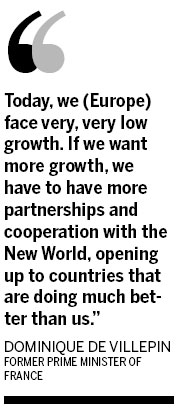

Few people doubt that the world is shifting away from a Western-dominated era toward a multipolar system.
Many believe it will inevitably be a painful process, as emerging powers challenge the status quo and incumbent powers struggle to keep their grip.
Dominique de Villepin, the former prime minister of France, believes a good world is not one dominated by a single power but an organized world with collective governance.
This is in everyone's interest, he said, even the United States. So the West should embrace it, not resist it.
"Look at what happened in the US recently: the dramatic shutdown crisis and debt ceiling stalemate. Can the world depend every year on the goodwill of the US Congress, whether it controlled by Democrats or Republicans?" he asked during an interview with China Daily.
The 60-year-old politician, an eloquent and fervent advocate of a multipolar world, is proposing new international governance bodies.
For example, in the economic arena, he suggested the establishment of an Economic Security Council at the United Nations, to better monitor the world economy, in addition to the International Monetary Fund and the World Bank.
"The common interest for all of us is to have better world governance," he said.

This "retaining power by sharing power" philosophy, he said, applies to international politics as well as to the world economy.
In the international field, it is essential to take a multilateral approach to manage instability in Iraq and any political crisis in Syria, for example.
In the economic arena, "if you want to anticipate risks and make real decisions, then you have to share power and the decisionmaking process," he said.
"So you need as many institutions at the world level as at the national level."
For Europe, he said it is imperative for the continent to open itself up more to embrace opportunities in the emerging markets.
"Today, we (Europe) face very, very low growth. If we want more growth, we have to have more partnerships and cooperation with the New World, opening up to countries that are doing much better than us."
China has a growth rate of 7.6 percent, he noted, "and that should encourage us to work with you. For that, we need organizations and good treaties, which is why we are negotiating a bilateral investment treaty with China", he said.
In his view, today's world can be divided into the New World and Old World. Europe and the US constitute the Old World, and they're the main debtors to the New World.
The New World has the money, the liquidity and the opportunity to invest, but it lacks ability in risk assessment.
The latter, so far, has been the exclusive role of the US, characterized by the dominance of the big three credit-rating agencies: Moody's Investors Service, Standard & Poor's Ratings Services and Fitch Ratings. These three account for 95 percent of the world's credit-rating market.
Their credibility, however, has been eroded by their failure to foresee the 2008 global financial crisis.
In addition, their criteria don't take sufficient account of different constraints or specific conditions, according to de Villepin. However, no new agencies can replace them at the moment.
This is why the Universal Credit Rating Group, a consortium of China's Dagong Global Credit Rating Co Ltd, Egan-Jones Ratings Co of the United States and RusRating of Russia, began operations in late June to provide investors with more choices.
De Villepin serves as the chairman of the group's international advisory council.
Cynics might doubt whether more international governance bodies would help, as existing international agencies such as the UN Security Council are routinely paralyzed by disagreements.
De Villepin said that "a culture of cooperation" should be promoted.
"We've seen new solutions to the chemical weapons crisis in Syria. The same happened in Iran's nuclear talks, when six parties cooperated.
"So it is possible. Of course, it is a process. It takes time," he said.